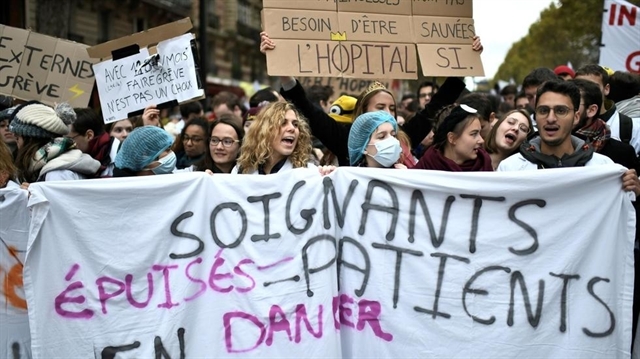 World
World


|
| A 2017 study by the Institute for Health Metrics and Evaluation ranked France in 15th place for quality of care. — AFP/VNA Photo |
PARIS — Thousands of French hospital workers demonstrated on Thursday over years of cutbacks they say have harmed care in a country with a health system once the envy of the world.
Public hospitals in France have been forced to cut 9.0 billion euros (US$9.9 billion) off their debts since 2005, leading to the scrapping of hundreds of beds and dozens of operating theatres while stagnant salaries have fuelled a flight to the private sector.
Calling on President Emmanuel Macron to "save public hospitals", thousands of hospital doctors, nurses, students and administrative staff held protests in Paris and a dozen other cities on Thursday.
The protests began in March when emergency room staff, who complain of elderly patients being left for hours on trolleys in corridors while waiting for a bed, began strike action.
Over 260 emergency rooms nationwide are still affected by the work stoppages.
On Thursday, staff from other hospital departments joined in the protests.
In Paris, organisers said that some 10,000 demonstrators marched through the city waving placards with message such as: "Exhausted caregivers = endangered patients", "Public hospitals in life-threatening emergency" and "The hospital is suffocating, let's save it."
In the southwestern city of Toulouse, 3,000 staff took to the streets, around 400 in Brest and Quimper in the northwest, and a few hundred each in other cities such as Nantes, Lyon, Bordeaux, Lille and Marseille.
Jean-Michel Carayol, a hospital technician who demonstrated in the Mediterranean port city of Marseille, said staff were "at the end of their tether and exhausted".
Monique Aubin, a 61-year-old nurse who also joined the protest, complained of a "lack of materials, even medication" and of being swamped in paperwork which left her little time for patients.
In 2000, the World Health Organisation ranked France's health system the best of 191 countries.
But a study by the Institute for Health Metrics and Evaluation published in The Lancet medical journal in 2017 placed it in 15th place for quality of care.
The country is still one of Europe's biggest spenders when it comes to healthcare.
In 2016, France spent 12 per cent of its GDP on health, well above the western European average of 10 per cent, and was also the country where the patient's share of the health bill was the lowest.
New winter of discontent?
The protests have created jitters in the government, which fears that hospital staff could band together with other disgruntled groups such as transport workers who are planning mass strike action in December over pension reforms.
Three health plans in the past two years have failed to appease the anger of beleaguered hospital staff.
In an attempt to head off another winter of discontent, a year after the start of the "yellow vest" revolt, Macron said on Thursday the government would unveil plans next week for "substantial" hospital investments.
While arguing that his centrist government had inherited an ailing hospital system, he said he had "heard the anger and the indignation over working conditions" in hospitals.
The protesters are demanding 3.8 billion euros in emergency investment in public hospitals - twice the amount set aside in the draft 2020 budget currently before parliament.
On Thursday, the upper house of the parliament, the right-wing dominated Senate, threw out the draft social security bill at its first reading in protest over what some senators described as Macron's "disdain" for the workers in the sector.
Economy Minister Bruno Le Maire has warned that hiking health spending will mean having to make cuts elsewhere.
France's budget deficit is expected to breach an EU limit of 3.0 per cent of GDP this year, reaching 3.1 per cent. — AFP




